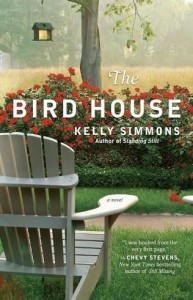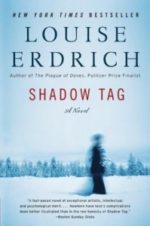 Synopsis:
Synopsis:
Ann Biddle is seventy-three years old, widowed, and the mother of one surviving child, Tom. She is also experiencing the early effects of Alzheimer’s or dementia: She has trouble remembering things, like directions, from time to time. Overall, though, Ann is remarkably healthy and is excellent shape for her age, still playing tennis and even able to climb trees.
Ann’s husband, Theo, was a workaholic architect whose legacy is strip malls in and about town. Tom is an attorney who, with his wife, Tinsley, has one precocious and charming eight-year-old daughter, Ellie. Now that Ellie is becoming a young lady, Ann wants to spend more time with her, and Ellie has a school assignment that requires Ann’s assistance: The completion of a project focused upon a particular aspect of the family’s life. So Ann ventures into the attic to search through trunks for scrapbooks, photo albums, old letters, and other memorabilia that will help Ellie.
The story is told through Ann’s diary entries, beginning with October 22, 2010, jumping back three months to July 1, 2010, then alternating between early 2010 and mid-1967 to late 1968. Along the way, questions about the family history are asked, memorabilia is explored, and secrets come to light — some long buried and forgotten, others newly discovered.
Review:

At the outset, Ann writes: “Forty years ago, my young daughter died because of something I did. Notice I stop short of saying I killed her, even though I clearly did. No one knows this. Do you think my daughter-in-law would ever let me near my granddaughter if she knew?” Ann then proceeds to tell the story of how difficult her daughter, Emma, was to manage as a toddler, with her tantrums and defiance; how emotionally distant Theo was from her and their children, always working long hours and leaving her to run the home alone; how she survived cancer; and about her high school boyfriend, Peter’s, unrequited love for her which is rekindled at their school reunion when she is just twenty-nine years old. Shortly after Tom’s birth, a sore right breast turns out to be more than the effect of breastfeeding and Ann undergoes a mastectomy.
Juxtaposed against Ann’s present-day struggles with her daughter-in-law, Tinsley, are Ann’s unresolved feelings about her own parents and their problems. Ann has always blamed her father for the demise of her parents’ marriage and her mother’s premature death (at the age of only fifty-three). But leave it to Ellie to find letters in a trunk in the attic that either Ann has never read before . . . or doesn’t remember reading. Those letters, written two years after her parents’ wedding, cause Ann to reconsider all of the assumptions she made earlier, even though it is too late to find answers to the questions those letters raise, even if she were inclined to look for them, because both of her parents have been dead for many years.
Ann’s perspective works best because her faulty memory makes her an unreliable narrator. I wanted readers to feel the tension and the worry of not knowing what she was going to do or say, or if they could trust her version of events. I love ambiguity and subtlety in a story, . . .
~~ Author Kelly Simmons
Ann also admits at the beginning of the story that her memory is fading. “Call it what you will: ‘senior moments,’ old age, dementia. It’s inevitable, that’s what it is. You go right ahead and complete all the crosswords your children press on you; but know they can keep you only so sharp.” That leaves the reader to figure out whether Ann’s memories — of which the book is totally comprised — are accurate or not. There is no way to tell, except when Ann relates what other characters have said to her about various situations or she admits, as when she gets lost trying to find her way home from a restaurant and nearly hits a deer, scaring Ellie, that she has experienced a memory lapse.
Both Ann and Tinsley are self-absorbed and selfish. Perhaps including the opening commentary about Ann’s culpability in her own daughter’s death was an unfortunate choice by the author because it made me dislike Ann from the outset. Frankly, despite all of her trials and tribulations, I just never came to care for Ann because she did nothing to improve her own circumstances. Her husband was distant, but there was no evidence that she tried to improve the marriage either by discussing her feelings with him or asking him to attempt marriage counseling. She has had feelings for Peter since high school, yet she cruelly and narcissistically strings him along for decades, even observing at one point that the only passion he appears to have ever experienced in his life has been directed at her, and even allows him to become embroiled in her daughter’s death. But she neither ends her unhappy marriage to be with him nor breaks things off with him so that he can pursue his own happiness elsewhere.
Worse, even though Ann appears on the surface to feel guilty about her little Emma’s death, the guilt seems to be present only because she thinks she should feel guilty. The anguish seems neither genuine nor deeply felt. Ann’s writing is devoid of the type of prose one would expect from a grieving mother. Instead, she recounts the various ways in which Emma challenged her and acted out, including the fact that, as a jealous four-year-old, she held her baby brother under the bath water and fed him some of her breakfast when Ann’s back was turned. She talks about playing with Emma, reading to her, etc., but also describes how exasperated Emma made her feel. Yes, four-year-olds, particularly when they cease to be the only child in the house, can be extremely exasperating. Completely absent are the anguished, soul-searching type of diary entries I imagine a mother who loved her child more than herself might make. She seems to coolly accept that her daughter died because she left her alone in the bathtub while she attended to her younger son. She even seemed more distressed about her mastectomy, sadly, than about the loss of her oldest child. Does Ann not grieve deeply for her child or have the entries conveying her true emotions merely been excluded by Simmons? The Bird House does not provide the answer.
As for Tinsley, the reader is not given enough information about her, Tom or their marriage to understand why she would engage in an extra-marital affair. And it is equally unclear for most of the story whether she is concerned about having Ellie spend so much time with Ann because of her memory lapses or another reason. The reader does not know how much information Tinsley or even Tom possesses about the circumstances surrounding Emma’s death. Whatever the reason, it really doesn’t matter because it is clear that Ellie and Ann adore each other, and no child should be kept from an adoring, loving grandparent. Tinsley does the right thing when she equips Ellie with a cell phone to be used in the event of an emergency. So the storyline lacks meaningful drama or intrigue. The only touching part of the storyline was the way Ann interacted with the wiser-than-her-years Ellie in order to protect her when Ann realizes that Tinsley is indeed having an affair and Ellie begins asking very pointed questions. But by the time Ann finally grows a spine and stands up to Tinsley about her duplicity, it is simply too little, too late. I was too entrenched in my apathy toward the characters and their problems. About her handling of her discovery of Tinsley’s affair, Ann writes, “We had our own constitution now, our little family, built on a solid foundation of lies, secrets, regrets, and debts. But even dark underpinnings can support something solid and light, can they not?” Unfortunately, when it comes to Ann, the answer is a resounding “no.”
I appreciate the effect that Simmons was seeking with regard to ambiguity and unanswered questions. Unfortunately, it is just not effective and serves only to frustrate her reader. Ultimately, because Ann is, as Simmons puts it, an “unreliable narrator,” and other characters’ voices do not fill in the missing details, the dramatic tension is insufficient, the unanswered questions too numerous. And because Ann is not a fully drawn, sympathetic mother figure, Simmons fails to achieve her goal. I cannot recommend The Bird House to readers who are looking for a compelling, heartening and empathetic glimpse into the mind of a woman of Ann’s age looking back over and reassessing her life through the prodding and inquisitiveness of her young grandchild as she faces the grim reality of her own fading memory. It’s a fascinating premise for a novel, but The Bird House just doesn’t live up to the promise of its theme.



7 Comments
[New Post] Book Review: The Bird House https://www.jhsiess.com/2011/02/17/book-r…
Pingback: Kelly Simmons, author of The Bird House, on tour February/March 2011 | TLC Book Tours
I’m sorry this one didn’t work out for you … hopefully your next read will be a better fit.
Thanks for being a part of the tour.
Wow, what a thorough thumping!
I kept waiting for you to say, ‘yeah, and I don’t like the title or the cover either!’
Different strokes for different folks. But I thank you for putting in the time and the effort — which I recognize you did. But I also recognize that you were expecting a more empathetic and sweet journey — and I disappointed you with a darker one. Feel free to burn the book the next time you feel a chill in your house — at least let me be good for something!!
@Kelly Simmons: I disagree that it was “a darker journey,” although that’s obviously what you intended. For me, it just wasn’t a journey — there were too many gaping holes, too many unexplained emotions, too many vast spaces lacking explanation or exposition. I could have enjoyed reading about a darker journey so long as I found something on the page to grab onto, understand, and empathize with or not. But the emotions of the characters just weren’t there in the words, on the pages.
As for burning the book, I would never do that. I will pass it on to someone else who might enjoy it, as some other reviewers have. I’m glad that I read the book. I’m just sorry that my honest review — which is what I promised TLC — disappointed you. I don’t enjoy disappointing an author who has been gracious enough to provide me with a review copy of his/her book. I much prefer to love the work and be able to say so!
But not every author can please every reader, of course. And as you say, “different strokes” and if other readers enjoy the book, good for them and good for you!
And just for the record, I love the cover. I think it is stunningly beautiful.
Pingback: The Bird House ~ Kelly Simmons « Iwriteinbooks's Blog
Oh! Bummer. I just finished reading it and really loved this book. Ah, well, too bad you didn’t but perhaps the next one you read you will enjoy! My review goes up on Weds, so I haven’t had much feedback from anyone yet, I’m just making my way through the previously posted reviews now that I’ve completed reading! 🙂